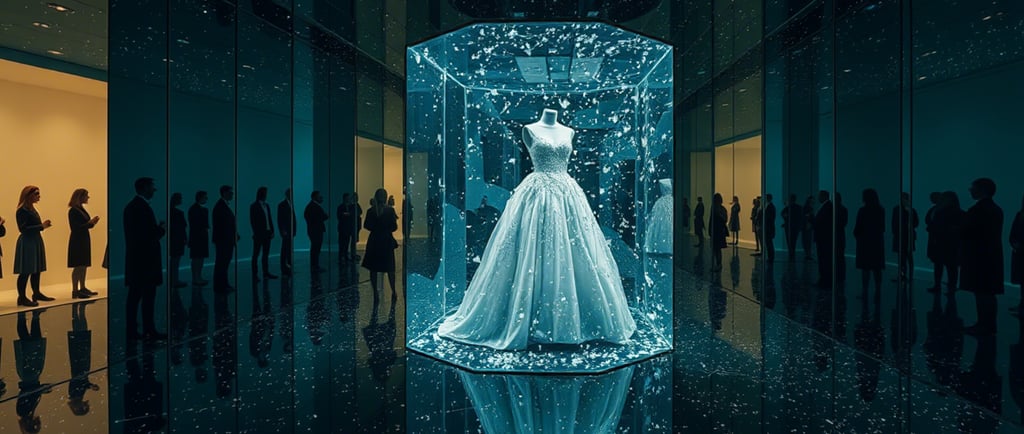The Human Side of Sales: Connecting with Clients in a Digital World
10/27/20253 min read


In a world where algorithms predict purchases before desire registers, where digital avatars greet customers through screens, and where transactions complete without a single word exchanged, something profound remains irreplaceable: the human connection. The luxury industry stands at this critical intersection of technological advancement and timeless human interaction, where success hinges not on abandoning tradition but on artfully blending heritage with innovation.
The Paradox of Digital Luxury
Luxury has always been defined by exceptional experiences, those rare moments when every detail aligns to create something extraordinary. While technology accelerates and simplifies countless processes, the essence of luxury retail continues to reside in connections forged between people. Research from McKinsey reveals that 70% of luxury consumers cite personal relationships with sales associates as a primary factor in brand loyalty, even as online purchases surge.
The digital transformation presents both challenge and opportunity. Virtual showrooms and augmented reality experiences offer unprecedented convenience, yet clients increasingly value authentic engagement amid the digital noise. This creates a fascinating paradox: as technology advances, the human elements of selling become more, not less, valuable.
The Neuroscience of Luxury Connections
What happens in the brain during meaningful human interactions cannot be replicated through digital means alone. Neuroscience research demonstrates that face-to-face interactions trigger neural synchronization between individuals, a phenomenon absent in purely digital exchanges. During personal consultations, mirror neurons activate, creating emotional resonance that builds trust and understanding.
For luxury clients, this neurological response translates to a sense of being truly understood. When a client advisor remembers personal preferences, acknowledges milestones, or shares genuine enthusiasm for a client's selection, the brain registers these moments as significant. The subsequent release of oxytocin, often called the "trust hormone", trengthens the client-brand relationship in ways impossible to achieve through automated processes.
Reimagining Client Relationships
Forward-thinking luxury brands have begun implementing "digital-human hybrid" approaches that leverage technology to enhance rather than replace human connections:
Digital Empowerment: Equipping client advisors with comprehensive data analytics and client history accessible through discreet devices, enabling seemingly effortless personalization during in-person interactions.
Micro-Moments of Connection: Identifying opportunities for meaningful human touchpoints within predominantly digital customer journeys, perhaps a handwritten note accompanying an online order or a video consultation before a significant purchase.
Emotional Intelligence Training: Investing in developing advisors' abilities to read subtle cues, demonstrate genuine empathy, and create emotional resonance with clients from diverse backgrounds.
The Client Memory Effect
Luxury purchases often commemorate significant life moments, achievements, celebrations, milestones. When these purchases include meaningful human interactions, the memory becomes richer and more emotionally resonant. The "client memory effect" describes how these enhanced emotional memories create stronger brand attachment and significantly higher lifetime value.
A remarkable example comes from a heritage jewelry house that implemented a "memory concierge" program. Client advisors document the stories behind significant purchases and reference these narratives during future interactions. This practice transforms transactions into chapters in an ongoing narrative, strengthening client loyalty through shared history.
The Technology Paradox
Perhaps most intriguing is how technological advancement has actually heightened appreciation for human connection. As digital interfaces become more sophisticated, clients increasingly value those rare moments of genuine human understanding. Smart luxury brands recognize this sentiment and strategically create spaces where technology recedes and human connection takes center stage.
Looking Forward: The Convergence
The future of luxury retail lies not in choosing between digital efficiency and human connection but in their thoughtful integration. The most successful brands will develop ecosystems where technology handles logistics, information, and convenience, freeing human talent to focus entirely on creating meaningful relationships and exceptional experiences.
The luxury sales associate of tomorrow will be both technologically empowered and deeply human, able to access vast amounts of data instantaneously while maintaining the emotional intelligence to connect authentically with clients. This convergence represents not merely an adaptation to changing times but an evolution toward something potentially more meaningful than either the purely traditional or purely digital approach could achieve alone.
In a world increasingly mediated by screens and algorithms, the ability to create genuine human connections becomes itself a luxury, perhaps the ultimate luxury. For those brands wise enough to nurture this capability, the digital age offers not a threat but an unprecedented opportunity to deepen the human side of sales.
